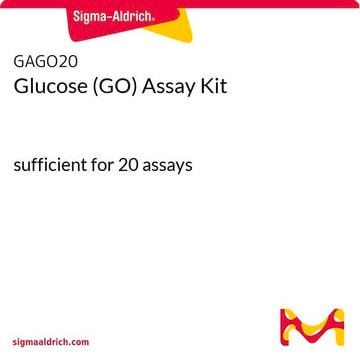MAK329
L-Lactate Assay Kit
sufficient for 100 colorimetric tests
Synonym(s):
L-Lactic Acid Assay Kit, Lactate Quantification Kit
About This Item
Recommended Products
usage
sufficient for 100 colorimetric tests
input
cell
plasma
serum
solution(s) (collagen)
detection method
colorimetric
relevant disease(s)
endocrinological disorders, diabetes; cancer
storage temp.
−20°C
General description
Application
- Cancer Research
- Diabetes Research
- Endocrinological Disease Research
Features and Benefits
Simplified Process: Experience a streamlined process with the addition of only a single working reagent and a 20 minute room temperature reaction, reducing complexity and saving valuable time and effort.
Compatibility with High-Throughput Systems: Easily incorporate our kit into high-throughput handling systems, ensuring smooth and accurate processing, enhancing efficiency in your laboratory workflow.
Suitability
Principle
Other Notes
Storage Class
10 - Combustible liquids
Choose from one of the most recent versions:
Certificates of Analysis (COA)
Don't see the Right Version?
If you require a particular version, you can look up a specific certificate by the Lot or Batch number.
Already Own This Product?
Find documentation for the products that you have recently purchased in the Document Library.
Our team of scientists has experience in all areas of research including Life Science, Material Science, Chemical Synthesis, Chromatography, Analytical and many others.
Contact Technical Service
